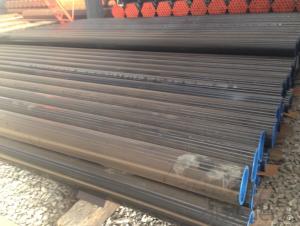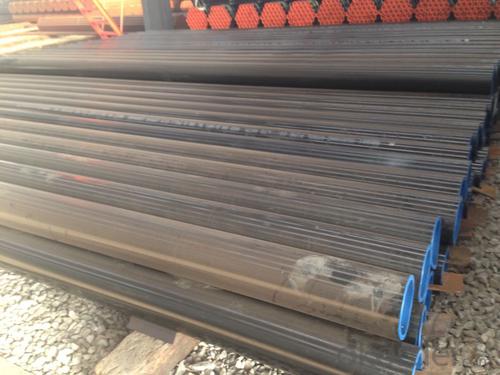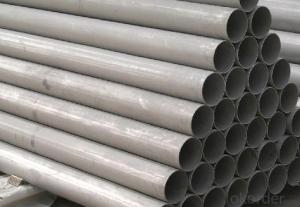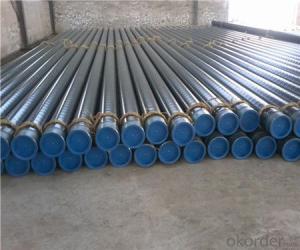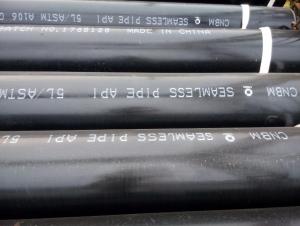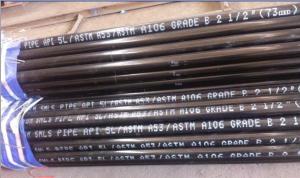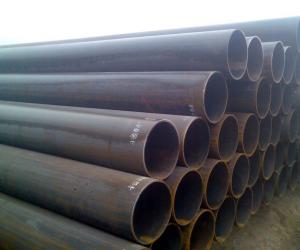LINE PIPE OF API 5L FOR THE OIL ,GAS DELIVERY
- Loading Port:
- Tianjin
- Payment Terms:
- TT OR LC
- Min Order Qty:
- 10 m.t.
- Supply Capability:
- 40000 m.t./month
OKorder Service Pledge
OKorder Financial Service
You Might Also Like
ERW STEEL PIPE:
高频直缝焊管
ERW steel pipe, that is electronic resistance welded pipe also called HFW.
高频直缝焊管 又 为电阻焊管。
Standard: API 5L PSL1, EN10219, ASTM A53,ASTM A500,ASTM A252
执行标准:
Material: GR.B, S275, S275JOH, S355JOH X42-X56 SS400
材质:
Dimensions:
尺寸:
Diameter: 8”-24”
外径:
Thickness: 6MM-20MM
壁厚:
Length: 6M-20M
长度:
Application: ERW pipe mainly used for oil, gas, water, steam gas and other middle and low pressure fluid delivery pipes and structural steel.
用途:我公司的高频直缝焊管主要用于石油、天然气、水、蒸汽、煤气等中低压流体运送输送管道及结构用钢管。
Products advantage: Huayang is near to the material supply mill, Hebei Zhongtie Equipment Company, which reduce the material cost. At the same time, Huayang is 210 kilometers from Beijing,150 kilometers from Tianjin City,160 kilometers from Xingang port, with convenient transportation, which is convenient for customer’s visit and reduce the transportation cost. So HUAYANG BRAND pipe cost is lower than that of other company, which can make more profits for the customers.
产品优势:
华洋公司靠近原料生产基地-河北中铁装备有限公司,有效地降低了原材料的采购成本。同时,华洋公司距离北京210公里,天津市150公里,天津新港160公里,交通便利,便于客户来访,同时降低了货物的运输成本。因此,华洋牌钢管的生产成本低于其他同类的生产厂家。
Quality assurance:
质量控制:
Our company has past the API 5L review, and attained the ISO9001:2008.And each export order pipe has been inspected by the third party, Cangzhou Huajian inspect & test Center.
我公司已经通过了美国石油协会的审核,并且获得了ISO9001:2008的认证。每一批出口的钢管都已经通过了第三方的检验-河北华健检测中心。
Ordering information:
订单信息
Minimum order: 20 MT or negotiate
最小起订量:20吨或协商
Supply ability: 30 thousand MT/month
供货能力:3万吨/月
Packing: bulk, bundles or as per requirements
包装:裸装、打捆或按照客户要求
Delivery time: 7-30day or as customers’ requirements
交货期:7-30天 或按照客户要求
Loading port: Xingang port
装运港:新港
Payment terms: T/T ,L/C at sight or negotiate
付款条件:电汇,即期信用证或协商
- Q: What is the difference between steel pipes and copper-nickel pipes?
- The main difference between steel pipes and copper-nickel pipes lies in their composition and characteristics. Steel pipes are primarily made of iron and carbon, whereas copper-nickel pipes are made of a combination of copper and nickel with trace amounts of other elements. Steel pipes are known for their strength and durability, making them suitable for a wide range of applications, particularly in industries where high pressure and temperature conditions are present. Steel pipes are also relatively cost-effective and have good corrosion resistance, especially when coated or galvanized. On the other hand, copper-nickel pipes are highly resistant to corrosion and have excellent heat transfer properties. They are commonly used in marine environments due to their resistance to saltwater corrosion. Copper-nickel pipes also exhibit antimicrobial properties, making them suitable for applications in healthcare and food processing industries. However, copper-nickel pipes are generally more expensive than steel pipes. In summary, steel pipes are valued for their strength and affordability, while copper-nickel pipes offer superior corrosion resistance and heat transfer properties, but at a higher cost. The choice between the two depends on the specific requirements of the application.
- Q: Can steel pipes be used in the oil and gas industry?
- Indeed, the oil and gas industry commonly utilizes steel pipes. Renowned for their robustness, longevity, and resistance to corrosion, steel pipes are well-suited for the transportation and storage of diverse fluids and gases within this sector. They possess the ability to endure high pressure and extreme temperatures, which are frequently encountered during oil and gas operations. Moreover, the ease with which steel pipes can be welded together facilitates efficient assembly and maintenance. Consequently, steel pipes represent a dependable and economically sound option for the oil and gas industry.
- Q: Can steel pipes be used for gas distribution?
- Yes, steel pipes can be used for gas distribution. Steel pipes are commonly used for transporting natural gas and other gases due to their high strength, durability, and resistance to corrosion. They can withstand high pressure and are suitable for long-distance gas distribution networks. However, it is important to ensure proper materials and installation techniques are used to prevent any potential safety hazards.
- Q: What are the different types of steel pipe bends for pipeline routing?
- There are several types of steel pipe bends commonly used for pipeline routing, including 90-degree bends, 45-degree bends, and 180-degree bends. Additionally, there are long radius bends and short radius bends, which refer to the curvature of the bend. These different types of bends allow for flexibility in pipeline design and routing to accommodate various installation requirements and project constraints.
- Q: Can steel pipes be used for transportation of hazardous materials?
- Yes, steel pipes can be used for the transportation of hazardous materials. Steel pipes are commonly used for transporting various types of hazardous materials such as chemicals, gases, and liquids. They are known for their strength, durability, and resistance to corrosion, making them suitable for safely transporting these materials over long distances. Additionally, steel pipes can be designed to meet specific safety standards and regulations to ensure the secure transportation of hazardous substances.
- Q: Can steel pipes be used for wastewater treatment?
- Yes, steel pipes can be used for wastewater treatment. Steel pipes are commonly used in the construction of wastewater treatment plants and systems due to their durability, strength, and resistance to corrosion. They are especially suitable for transporting and distributing wastewater, as they can withstand high pressure and temperature variations. Steel pipes can also be coated or lined with materials that provide additional protection against corrosion and chemical reactions with the wastewater. However, it is important to ensure that the steel pipes are properly maintained, inspected, and replaced when necessary to prevent any potential leaks or failures that could compromise the wastewater treatment process.
- Q: What are the different methods of insulation for steel pipes?
- There are several methods of insulating steel pipes, including applying a thermal insulation coating, using pipe wraps or jackets, using foam insulation, or utilizing heat shrink sleeves.
- Q: What are the different types of steel pipes available in the market?
- There are several different types of steel pipes available in the market, each designed for specific purposes and applications. Some of the most common types include: 1. Carbon Steel Pipes: These are the most widely used type of steel pipes, known for their strength and durability. They are primarily used for transporting fluids and gases in various industries such as oil and gas, construction, and plumbing. 2. Alloy Steel Pipes: These pipes are made by combining different metals, such as chromium, nickel, or molybdenum, with carbon steel. Alloy steel pipes offer enhanced strength, corrosion resistance, and heat resistance. They are often used in high-pressure applications, such as in power plants and chemical plants. 3. Stainless Steel Pipes: Stainless steel pipes are highly resistant to corrosion and oxidation, making them suitable for applications where hygiene and durability are crucial. They are commonly used in industries like food processing, pharmaceuticals, and water treatment. 4. Galvanized Steel Pipes: These pipes are coated with a layer of zinc to protect them from rust and corrosion. Galvanized steel pipes are commonly used in plumbing systems and outdoor structures, such as fences and handrails. 5. Seamless Steel Pipes: Seamless pipes are produced without any welding or joints, resulting in a smooth and continuous surface. They are known for their high strength and are often used in high-pressure applications. 6. Welded Steel Pipes: Welded pipes are made by rolling or bending a flat steel plate into a cylindrical shape and then welding the edges together. They are commonly used in industries such as construction, oil and gas, and automotive. 7. ERW (Electric Resistance Welded) Steel Pipes: ERW pipes are made by passing a high-frequency electrical current through the steel strip, causing it to heat and form a weld. They are widely used in various applications, including plumbing, water wells, and structural support. 8. LSAW (Longitudinal Submerged Arc Welded) Steel Pipes: LSAW pipes are made by bending and welding steel plates into a cylindrical shape. They are commonly used for transporting large volumes of oil, gas, or water over long distances. These are just a few examples of the diverse range of steel pipes available in the market. The choice of the right type of steel pipe depends on factors such as the intended application, environmental conditions, and budget considerations. It is important to consult with experts or professionals to determine the most suitable type of steel pipe for a specific project or application.
- Q: How do you remove rust from steel pipes?
- To remove rust from steel pipes, there are several methods you can try: 1. Use a wire brush or steel wool: Start by scrubbing the rusted areas with a wire brush or steel wool. This will help remove loose rust and flakes from the surface of the pipes. 2. Apply vinegar or lemon juice: Soak a cloth or sponge in white vinegar or lemon juice and apply it to the rusted areas. Let it sit for a few hours or overnight. The acidic properties of these substances can help dissolve the rust. 3. Use a rust remover or converter: There are various rust remover products available in the market. Follow the instructions on the product and apply it to the rusted areas. These solutions typically convert rust into a water-soluble compound that can be easily rinsed off. 4. Apply a paste of baking soda and water: Mix baking soda with water to create a thick paste. Apply the paste to the rusted areas and let it sit for a few hours. Scrub the area using a brush or steel wool, and then rinse it off. 5. Try using a commercial rust dissolver: If the above methods don't yield satisfactory results, you can consider using a commercial rust dissolver. These products are specifically designed to remove rust from various surfaces, including steel pipes. Follow the instructions provided by the manufacturer. Remember to wear protective gloves, goggles, and a mask when working with rust removal products, as they can be corrosive or release toxic fumes. Additionally, after removing rust, it is advisable to apply a rust-inhibiting primer or paint to prevent future rusting.
- Q: Can steel pipes be used for structural purposes?
- Yes, steel pipes can be used for structural purposes.
Send your message to us
LINE PIPE OF API 5L FOR THE OIL ,GAS DELIVERY
- Loading Port:
- Tianjin
- Payment Terms:
- TT OR LC
- Min Order Qty:
- 10 m.t.
- Supply Capability:
- 40000 m.t./month
OKorder Service Pledge
OKorder Financial Service
Similar products
Hot products
Hot Searches
Related keywords
